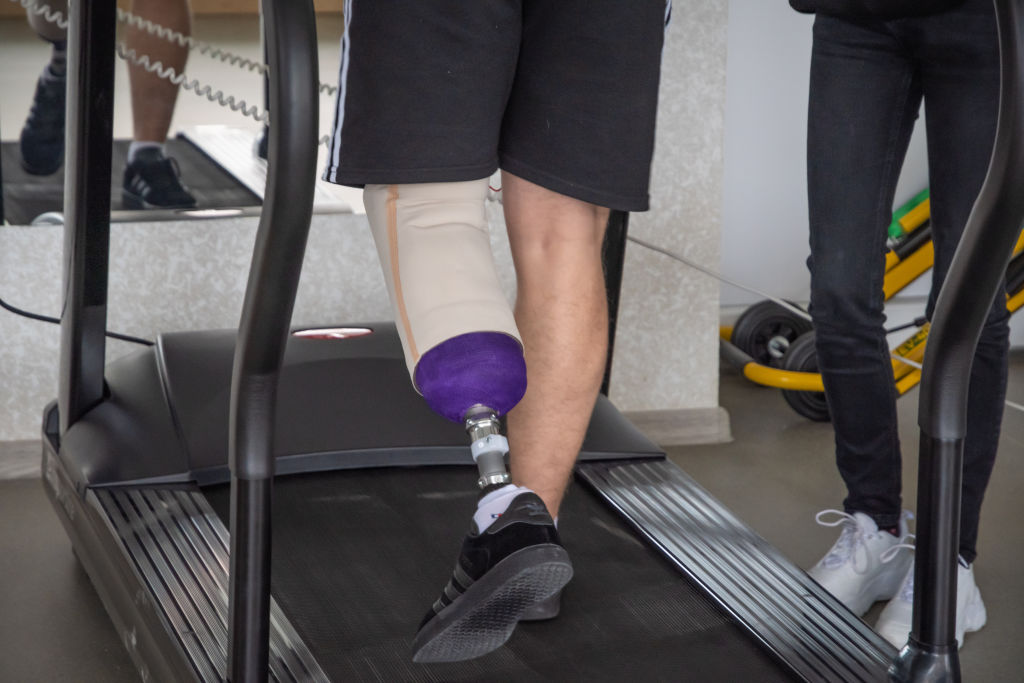Amputee rate in Ukraine rises to level akin to WWI


A free daily email with the biggest news stories of the day – and the best features from TheWeek.com
You are now subscribed
Your newsletter sign-up was successful
Since the start of the Russo-Ukranian War, the number of people in need of amputations in Ukraine has spiked to levels that haven't been seen since World War I, according to a Wall Street Journal report. The rise in injuries requiring amputation reflects "how Russia wages the war, with heavy use of mines and artillery, missile and drone attacks targeting soldiers and civilians alike," the Journal noted.
Russia's use of heavy artillery and the "deployment of multi-layered mines on the 600-mile front line in eastern and southern Ukraine" has led to a sharp increase in serious injuries, the Journal added. The outlet estimated that between 20,000 and 50,000 Ukrainians have lost a limb or two since the beginning of the war 17 months ago. This data came from previously unreleased estimates from prosthetics firms, doctors, and charities. The number could be higher than estimated, as many amputations aren't reported until months after the procedure.
"My grandfather founded our company in 1919 to help…German soldiers returning from World War I wounded by artillery fire, who lost their arms, legs or eyesight—this is exactly what we see in Ukraine," Hans Georg Näder, chairman of German prosthetics manufacturer Ottobock, told the Journal. Ottobock, the world's largest prosthetics manufacturer, is helping Ukraine with amputees. The outlet added that about 41,000 Britons and 67,000 Germans required amputations during World War I.
The Week
Escape your echo chamber. Get the facts behind the news, plus analysis from multiple perspectives.

Sign up for The Week's Free Newsletters
From our morning news briefing to a weekly Good News Newsletter, get the best of The Week delivered directly to your inbox.
From our morning news briefing to a weekly Good News Newsletter, get the best of The Week delivered directly to your inbox.
Before the war, Ukraine had a few thousand amputations yearly, but now hospitals and doctors are overwhelmed, with few expert staff to keep up with the influx. The Journal also pointed out that while military personnel who need amputations receive $20,000 in government funds to get prostheses, many civilians struggle to pay without help from charities. Dr. Kostyantyn Mylytsya, who focused on cosmetic surgery before the war, runs a clinic that treats and rehabilitates amputees. Clinics like his are needed "in every town across Ukraine; they must be as common as dentists," he told the Journal.
A free daily email with the biggest news stories of the day – and the best features from TheWeek.com
Theara Coleman has worked as a staff writer at The Week since September 2022. She frequently writes about technology, education, literature and general news. She was previously a contributing writer and assistant editor at Honeysuckle Magazine, where she covered racial politics and cannabis industry news.
-
 Switzerland could vote to cap its population
Switzerland could vote to cap its populationUnder the Radar Swiss People’s Party proposes referendum on radical anti-immigration measure to limit residents to 10 million
-
 Political cartoons for February 15
Political cartoons for February 15Cartoons Sunday's political cartoons include political ventriloquism, Europe in the middle, and more
-
 The broken water companies failing England and Wales
The broken water companies failing England and WalesExplainer With rising bills, deteriorating river health and a lack of investment, regulators face an uphill battle to stabilise the industry
-
 Scientists are worried about amoebas
Scientists are worried about amoebasUnder the radar Small and very mighty
-
 A Nipah virus outbreak in India has brought back Covid-era surveillance
A Nipah virus outbreak in India has brought back Covid-era surveillanceUnder the radar The disease can spread through animals and humans
-
 Trump HHS slashes advised child vaccinations
Trump HHS slashes advised child vaccinationsSpeed Read In a widely condemned move, the CDC will now recommend that children get vaccinated against 11 communicable diseases, not 17
-
 Deaths of children under 5 have gone up for the first time this century
Deaths of children under 5 have gone up for the first time this centuryUnder the radar Poor funding is the culprit
-
 A fentanyl vaccine may be on the horizon
A fentanyl vaccine may be on the horizonUnder the radar Taking a serious jab at the opioid epidemic
-
 Health: Will Kennedy dismantle U.S. immunization policy?
Health: Will Kennedy dismantle U.S. immunization policy?Feature ‘America’s vaccine playbook is being rewritten by people who don’t believe in them’
-
 More adults are dying before the age of 65
More adults are dying before the age of 65Under the radar The phenomenon is more pronounced in Black and low-income populations
-
 Ultra-processed America
Ultra-processed AmericaFeature Highly processed foods make up most of our diet. Is that so bad?
